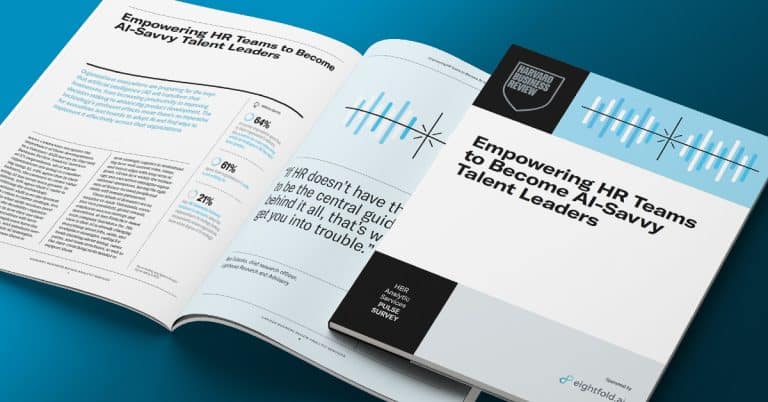
Empowering HR teams to become AI-savvy talent leaders
Empowering HR teams to become AI-savvy talent leaders
While every organization searches for ways to integrate AI into operations, there is one essential partner often overlooked — HR. Yet HR is the lifeblood of every business as these leaders drive talent strategies and close skills gaps to shape future success.
We commissioned this report from Harvard Business Review Analytic Services (HBR-AS) to evaluate the state of C-suite and senior leadership thinking about AI adoption and where they’re focusing first. And while 91% of survey respondents agreed that having the right talent is essential to AI success, only 21% told us that HR leadership is closely involved in decisions about their organizations’ AI strategies.
In this report, you’ll learn:
- How the C-suite and other business leaders are thinking about AI adoption.
- The disconnect between C-suite/leadership and HR — and how these misperceptions are costing the business top talent.
- How HR leaders can position themselves to take a more strategic seat at the AI table.
A once in a generation opportunity
Agentic AI is triggering the most exciting and profound innovations in the history of human resources since the strategic business practice was founded in the early 20th century. This artificial intelligence (AI) movement is unfolding so fast that we sponsored a Harvard Business Review Analytic Services survey of C-suite executives and others involved in their organization’s use of AI and asked them about their plans for adopting these technologies in the near future.
The following report finds that 64% of respondents agree that the pressure to create value using AI in their industries has never been greater. Moreover, 61% agree that their C-suite is making AI a priority. At the same time, decision makers are looking to AI to raise productivity and drive revenue growth.
However, enterprises will require having the right workforces that are capable of capitalizing on the benefits of AI. Our experiences working with Fortune 500 companies have revealed that AI investments will not meet expectations without the right talent and technologies—and the right collaboration, implementation, and change management plans—in place.
Just as critical, the HR department’s leadership is required to ensure the success of company-wide AI initiatives. The C-suite will need to collaborate more closely to navigate these issues and effectively execute the organization’s top-down AI strategy—including agentic AI—which typically includes deploying AI-native HR and talent platforms to help them modernize their workforce.
We hope this Harvard Business Review Analytic Services report inspires you as you embark on your AI journey. It will help you understand the opinions of your peers who are working quickly to establish comprehensive AI strategies to increase productivity, create new competitive advantages, and drive growth.
— Ashutosh Garg, Co-founder and Co-CEO, Eightfold AI
Empowering HR teams to become AI-savvy talent leaders
Organizations everywhere are preparing for the ways that artificial intelligence (AI) will transform their businesses, from increasing productivity to improving decision making to enhancing product development. The technology’s profound effects mean there’s an imperative for executives and boards to adopt AI and find ways to implement it effectively across their organizations.
- 64% of survey respondents agree that, in their organization’s industry, the pressure to create value using artificial intelligence (AI) has never been greater.
- 61% agree that their organization’s C-suite is prioritizing AI.
- 21% say HR leadership is closely involved in decisions about the organization’s AI strategy (among respondents whose organizations have some degree of AI strategy).
Many companies recognize the importance of these developments. In a February 2025 survey by Harvard Business Review Analytic Services of 371 respondents, all of whose organizations are using or considering using AI, 64% agree that in their industry, the pressure to create value using AI has never been greater. In addition, 61% agree their C-suite is prioritizing the technology.
A seismic shift is on the horizon when it comes to talent strategy, too, not just in what skills workers need but also in the flexibility organizations require in how they use their workforces. Executives will have to ensure their employees have the skills, capabilities, and mindsets necessary to support their AI strategies.
For HR, that remit means there is now strategic urgency to understanding how well current roles, teams, and talent align with long-term AI goals. Given how widely the technology lets executives reimagine organizational operations, having the right mix of future-focused people and skills will remain paramount.
You might also like...
Get the latest talent news in your inbox every month
By submitting this form, I consent to Eightfold processing my personal data in accordance with its Privacy Notice and agree to receive marketing emails from Eightfold about its products and events. I acknowledge that I can unsubscribe or update my preferences at any time.
